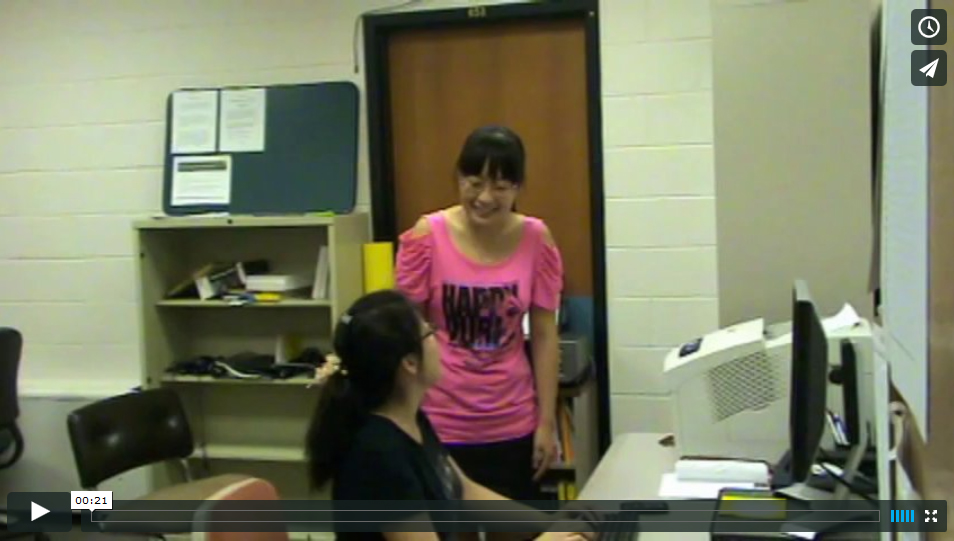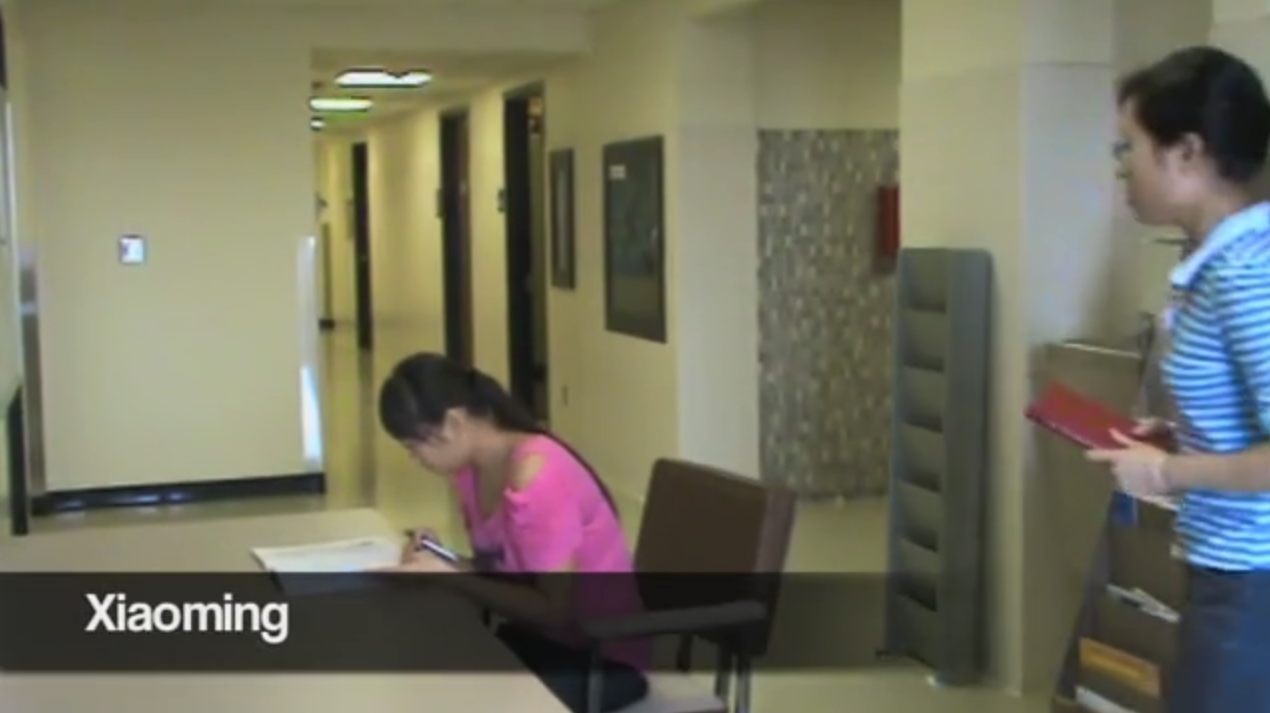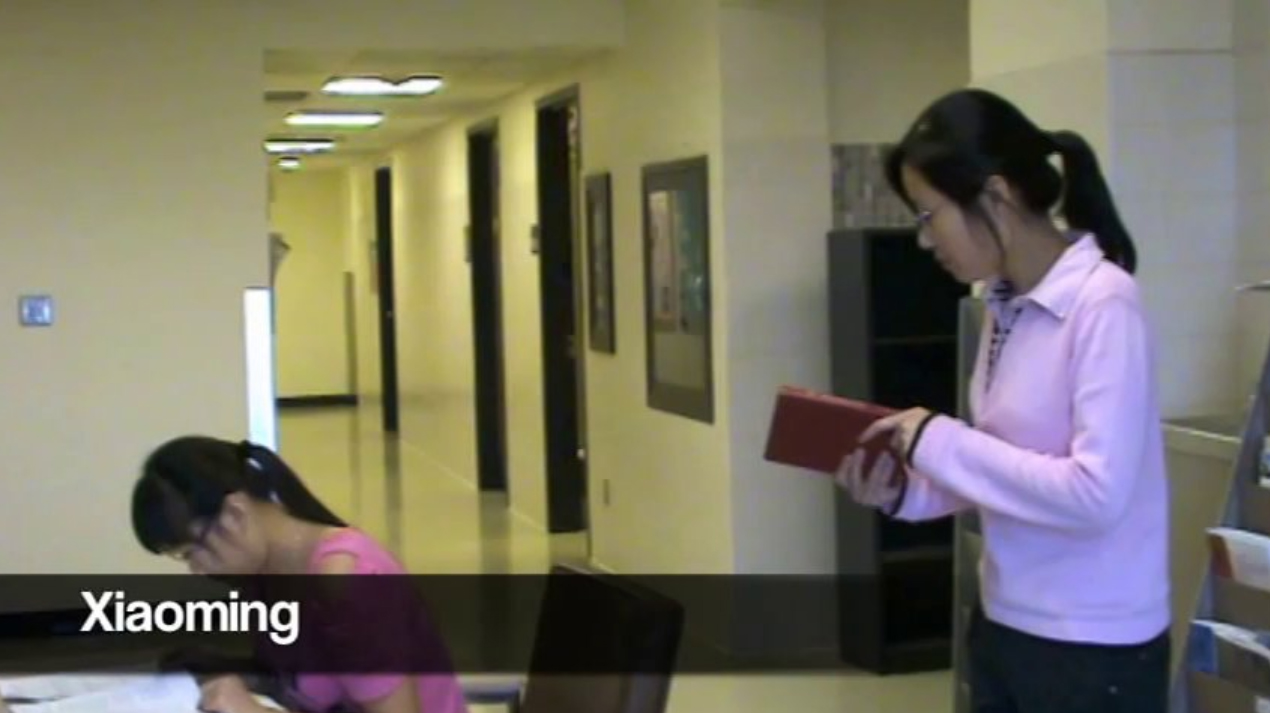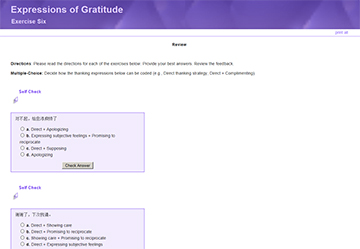Unit 6: Combinations of Thanking Strategies
Unit 6 explicitly informs students of different combinations of direct strategies and indirect strategies to express gratitude in Chinese, and also provides them with exercises/activities for practice.
6.1 Goal of Unit 6
The goal of Unit 6 is to familiarize students with different combinations of thanking strategies in Chinese. In particular, this unit provides video examples that illustrate the use of combinations of direct strategies and the indirect strategies of apologizing and showing care, and offers students a variety of exercises to train them to code expressions into formulas.
6.2 Combinations of Thanking Strategies
We have learned in previous units how to combine direct thanking strategies and different types of indirect thanking strategies in Chinese. There is a possibility of combining these strategies in varied ways, but when to use these combinations still largely depends on specific situations and interlocutors. This section reviews some of the possible combinations in Chinese by providing detailed scenario descriptions.
1. Something is wrong with your bicycle, and you cannot fix it. You ask one of your classmates, who happens to be good at bicycle mechanics, for help. After the classmate helps you fix the problem, you may express your gratitude toward your classmate by saying:
太谢谢你了!你真厉害!(Direct + Complimenting)
Tài xièxiè nǐ le! Nǐ zhēn lìhai!
谢谢啊,我真是太笨 (bèn, clumsy; stupid)了!(Direct + Blaming)
Xièxiě nǐ a, wǒ zhēn shì tài bèn le!
2. Your best friend travels to Beijing and brings a gift back for you. You may express your gratitude toward your friend by saying:
你真好!这个礼物我很喜欢!(Complimenting + Expressing subjective feelings)
Nǐ zhēn hǎo! Zhè gè lǐwù wǒ hěn xǐhuan!
3. You travel to Shanghai by train. Just before getting off, the stranger sitting opposite you wishes you a nice trip. You may express your gratitude toward this stranger by saying:
谢谢,也祝你旅行愉快!(Direct + Promising to reciprocate)
Xièxiè, yě zhù nǐ lǚxíng yúkuài!
6.3 Combination: Direct + Apologizing
The strategy of apologizing can be used to express gratitude in Chinese independently, that is, Chinese speakers can successfully express appreciation by using certain apologetic expressions; on the other hand, a combination of this strategy and direct thanking strategies can also be used to realize the speech act of thanking in Chinese.
Below we provide you with a video in which Xiaoming (a girl) expresses gratitude to a stranger.
Scenario 1: Xiaoming's laptop crashes, but she needs to check important information online. She asks a stranger if she could use her laptop for a minute for checking information.
Xiaoming's response: 太谢谢你了,同学。不好意思,打扰 (dǎ rǎo , to interrupt; to disturb) 你学习了。
Scenario One: Checking Emails
Click on the above image, or click on this link.
Transcript:
Xiaoming:
同学,你好。Tóngxué, nǐ hǎo.
我可以用 (yòng, use) 你的电脑 (diànnǎo, computer) 查 (chá, check) 一点儿东西 (dōngxi, things; stuff) 吗?
Wǒ kěyǐ yòng nǐ de diànnǎo chá yìdiǎnr dōngxi ma?
(English translation: Can I use your computer to check something?)
A stranger:
嗯,好。En, hǎo,
One minute later…
Xiaoming: 太谢谢你了,同学。 不好意思,打扰你学习了。
Tài xièxiè nǐ le, tóngxué. Bùhǎoyìsi, dǎrǎo nǐ xuéxíle.
Another video example is provided below.
Scenario 2: One of Xiaoming's classmates travels to Hong Kong, and Xiaoming asks her to help buy her a book which is only available there. After the classmate returns and gives the book to Xiaoming,
Xiaoming's response:
太谢谢你了,麻烦你了,从这么远(yuǎn, far; distant) 的地方 (dìfang, place; locality) 帮我把书带回来。
Scenario Two: Books
To access the video, click here.
Transcript:
Xiaoming’s classmate:
Xiaoming, 我把书给你带回来了。给你。
Wǒ bǎ shū gěi nǐ dài huílai le. Gěinǐ.
(English translation: I have brought the book back to you. Here it is.)
Xiaoming:
太谢谢你了,麻烦你了,从这么远的地方帮我把书带回来。
Tài xièxiè nǐ le, máfan nǐ le, cóng zhème yuǎn de dìfang bāng wǒ bǎ shū dài huílai.
6.4 Combination: Direct + Showing Care
Similar to the apologizing strategy, the indirect strategy of showing care can also be combined with direct thanking strategies for gratitude realization in Chinese. Below you will find a video in which Xiaoming (a girl) expresses gratitude to one of her classmates.
Scenario: One of Xiaoming's classmates travels to Hong Kong, and Xiaoming asks her to help buy her a book which is only available there. After the classmate returns and gives the book to Xiaoming,
Xiaoming's response: 谢谢啊,辛苦你了!还把书从那么远的地方给我带回来。
Scenario Three: Books
Please click on this link for the video.
Transcript:
Xiaoming’s classmate:
Xiaoming, 我把书给你带回来了。给你。 Wǒ bǎ shū gěi nǐ dài huílai le. Gěinǐ
(English translation: I have brought the book back to you. Here it is.)
Xiaoming:
谢谢啊,辛苦你了,还把书从那么远的地方给我带回来。
Xièxiè a, xīnkǔ nǐ le, hái bǎ shū cóng nàme yuǎn de dìfang gěi wǒ dài huílai.
In addition, Xiaoming may also choose to add the strategy of promising to reciprocate to this combination. For example, the thanking expressions can be
谢谢啊,辛苦你了!多少钱,我把钱给你!
(Direct + Showing care + Promising to reciprocate)
As discussed in previous units, there is a possibility of combining these thanking strategies in many different ways, such as direct + showing care + promising to reciprocate mentioned above, but when and how to combine these strategies still depend on particular contextual factors, which will be discussed in Unit 8.
Review
Please click the Review link to access the review for this section.



